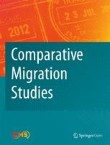Having observed a rapid growth of migration studies in recent decades, this commentary series engages with questions of how the field has institutionalised, or come of age, and what this means for current as well as future migration research.
Nathan Levy, Asya Pisarevskaya, and Peter Scholten open the series by introducing the three thematic focuses structuring the discussion, namely, self-referentiality, internationalisation, and the formation of epistemic communities. Through a combination of interviews and bibliometric analyses, they find indications of institutionalisation in relation to these focuses. This is observed for instance in citation links between journal articles on migration, the formation of inter- and even post-disciplinary epistemic communities, and significant but uneven internationalisation.
Yuk Wah Chan picks up on the latter theme in her response by focusing on Asian migration scholarship, which, in the past two decades has provided a “great impetus” for developing the field, but whose contribution has been underestimated. Eleonore Kofman applies this discussion to the specific epistemic community of gender and migration experts, calling for more research on the structural aspects of “unequal internationalisation” in the field. This may, as Josh DeWind argues, be related to the fact that field is simply so big that researchers operate in the same way as the blind men and the elephant, limited to their geographic and epistemic environments. He also calls into question whether institutionalisation ought to be viewed as something positive for the field, or rather a sign of homogenisation. Russell King, in his response, also invokes a critique of the “essentialization” of migrants in migration studies, while also highlighting the Levy et al’s oversight of the key contribution of geographers to the field, which, he suggests, might be down to the fact that they have contributed to multiple epistemic communities, rather than forming their own. This would be contrary to other disciplines, particularly economics, which have maintained a stronger identity throughout the history of the field, as James Hollifield points out in his discussion of interdisciplinarity. Steven Vertovec also draws on transnationalism as an interdisciplinary innovation as one of his two – rather than the customary three – cheers for migration studies. However, he argues that migration researchers have not done enough to impact policy and public understandings of their topic.
___________________________________________________
Note: This commentary series marks the close of the CrossMigration Horizon 2020 project, led by IMISCOE, which took stock of migration studies and aims to facilitate systematic knowledge accumulation in the field via the Migration Research Hub (migrationresearch.com). A roundtable involving the contributors to this series, chaired by Jørgen Carling, was held at the project’s closing conference in Lisbon in February 2020. That discussion can be viewed here.
Editors: Prof. Peter Scholten, Dr. Asya Pisarevskaya, Nathan Levy

